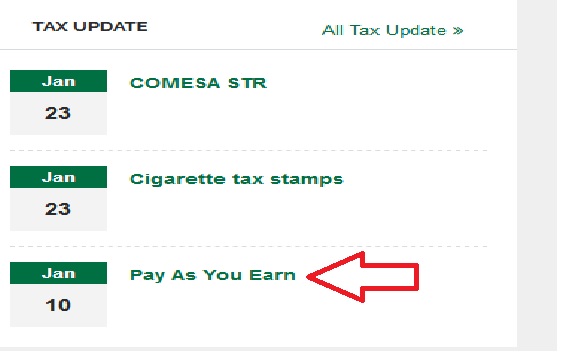mra.mw PAYE Pay As You Earn : Malawi Revenue Authority
Organization : Malawi Revenue Authority
Type of Facility : PAYE Pay As You Earn
Country: Malawi
| Want to comment on this post? Go to bottom of this page. |
|---|
Website : http://www.mra.mw/
MRA PAYE Pay As You Earn
Pay As You Earn (PAYE) is a method of collecting Income Tax in advance from employees on their earnings. Deduction is done by the employer when the payments are made.
Related : Malawi Revenue Authority Register For VAT Value Added Tax : www.statusin.org/8969.html
It could be weekly, fortnightly or monthly hence the name Pay As You Earn.
Who is eligible to operate PAYE?:
Any employer who pays an employee in excess of K20, 000.00 per month or K240, 000.00 per year is liable to deduct PAYE and remit to MRA.

PAYE Rates
With effect from 1st July 2013, the applicable rates for PAYE on a monthly basis are as follows:
** The first K20, 000. 00 at 0%
** The next K5, 000. 00 at 15%
The excess of K25, 000. 00 at 30%.
When should an employer register for operation of PAYE?:
An employer who employs people whose earnings exceed K20, 000 per month or K240, 000 in a year is required to register for operation of PAYE.
Upon registration, MRA will supply the employer with registration forms (Form P1) where all the details concerning the employer and the appropriate number of employees who are eligible for PAYE are filled. An employer is required to register for PAYE within a period of 21 days after becoming an employer.
In case of changes, for example, an employee has resigned, such employer is required to communicate to MRA within 14 days upon making those changes.

What other details does Form P1 contain?:
** The name of the organisation
** The name of the officer (employer’s representative) or public officer who will be handling taxation issues on behalf of the organisation or company.
** Name of other places where the employer has offices or branches.
** Number of employees who earn more than K20, 000 per month or K240, 000 per annum.
** A declaration by the employers’ representative that the information given is correct.
** Physical and postal addresses and contact numbers of the taxpayer.
When and where should PAYE be paid?:
The deduction of PAYE from an employee’s earnings becomes due at the time when earnings are paid to the employee.
The amount of tax deducted should be remitted to MRA not later than the 14th day from the end of the month during which the tax was deducted.
MRA will give the employer Form P12. This is a monthly payment form that should accompany any PAYE payments to MRA every month.
Usually, a booklet of 12 copies of Form P12 is supplied to the employer to cover a period of one fiscal year.
Advantages of PAYE to taxpayers:
** It is convenient to pay while the money is available.
** It is easy and cost effective to pay.
** Affords the taxpayer to pay by installments other than having the burden to pay a lump sum.
What would happen to an employer who fails to remit or register their employees who earn more than K20, 000 per month or K240, 000 in a year?
Any employer who fails to register their employees who are eligible for PAYE or remit PAYE deducted should pay all taxes due from the time he/she would have registered their employees plus an additional sum of 20% penalty of the taxes defaulted for the first month and a further additional sum of 5% per month or part thereof for the period during which the amount of the tax remains unpaid.
Notice:
The Law relating to Income Tax is Taxation Act. This information is not intended to be a legal interpretation of the Act (regulations made there under) nor does it override any provision thereof.
If One is getting 60 grand plus 30 grand as House allowance how much Tax is he or she going to be deducted?
Is there any change on the rates for PAYE in the just passed 2016/2017 national budget?
Whether a one-off payment in respect of “leave grant” meant to subsidize an employee over transport home eligible for PAYE tax?
What happens when the due date for remittance of pay falls on a public holiday?